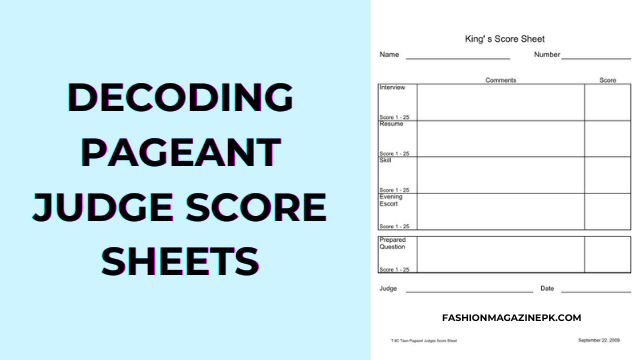Introduction:
Contents
Welcome to our guide on pageant judge score sheets, where we unravel the intricacies of how contestants are evaluated in beauty pageants. Behind the glitz and glamour lies a structured scoring system that ensures fairness and impartiality in determining the winners.
Components of a Pageant Judge Score Sheet:
- Appearance: One of the fundamental aspects of any pageant is the contestants’ appearance. Judges assess factors like grooming, poise, and stage presence. A contestant’s ability to exude confidence and elegance on stage can significantly influence their scores in this category.
- Personality: Beyond physical attributes, judges look for contestants who possess a captivating personality. Charisma, confidence, and communication skills play a crucial role here. Contestants who can engage the audience and convey authenticity are likely to score higher in this category.
- Talent: The talent portion of a pageant allows contestants to showcase their unique skills and abilities. Judges evaluate creativity, skill level, and stage presence during this segment. Whether it’s singing, dancing, or performing a special talent, contestants must leave a lasting impression to earn high scores in this category.
- Interview: The interview round provides judges with a deeper insight into the contestants’ personalities and aspirations. Articulation, knowledge, and authenticity are key factors considered during this phase. Contestants who can express themselves eloquently and demonstrate genuine passion for their platform often receive favorable scores from the judges.
- Overall Impression: In addition to individual categories, judges also assess contestants based on their overall impression throughout the competition. Factors like consistency, confidence, and uniqueness contribute to this holistic evaluation. Contestants who maintain a strong presence both on and off stage are more likely to leave a lasting impression on the judges.
Scoring System:
Pageant judge score sheets typically utilize a numerical scoring system, where each category is assigned a specific point range. Judges assign scores based on their observations and assessments of the contestants’ performances. These scores are then tallied to determine the finalists and eventual winners of the pageant.
Tips for Judges:
For judges tasked with evaluating pageant contestants, it’s essential to approach the scoring process with fairness and impartiality. Here are a few tips to ensure an effective and objective assessment:
- Remain objective and focus on the established criteria for each category.
- Avoid biases or personal preferences when assigning scores.
- Take notes and reference specific examples to support your evaluations.
- Maintain confidentiality and professionalism throughout the judging process.
Conclusion:
Pageant judge score sheets serve as the backbone of fair and transparent competitions, providing a structured framework for evaluating contestants’ performances. By understanding the components of these score sheets and adhering to best practices as judges, we can ensure that pageants uphold the values of integrity and excellence in crowning deserving winners.
We hope this guide has provided valuable insights into the world of pageant judging and scoring. Feel free to share your thoughts or experiences with pageant judge score sheets in the comments below!




